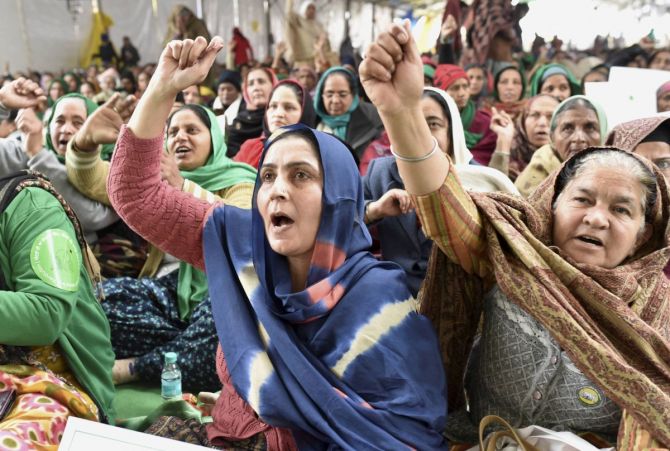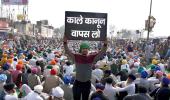'Why is it so hard for those claiming to be their well-wishers to persuade them to lift the siege and wait for the expert panel to address their grievances?' asks Virendra Kapoor.

Donald Trump believed he had been cheated out of an election he claimed he had won with over seven million votes.
He fuelled the false impression for weeks, eventually gathering his equally misguided supporters in front of the Capitol Hill.
And when the day neared for the real winner to be certified as the next US president-elect, he incited his crazed supporters to try and forcibly reverse the legal outcome.
The result was the desecration of the highest seat of American democracy.
Now, cut to the Singhu border where thousands of mainly Sikh peasants have squatted for 50 days, blocking the passage to the national capital.
Their single-point demand is the repeal of the three farm reform laws.
In bitter cold and open fields they have rigged up a comfortable make-shift township on tractor-trailers, customised buses and trucks and in swanky airtight tent-sheds.
The hardy lot is happily roughing it out, determined on nothing short of the repeal of the laws.
However, failure to force the government on its knees has now led them to further step up pressure.
The proposed tractor parade on Republic Day on Rajpath is fraught with a severe law and order threat.
To claim that the protesting farmers have been peaceful thus far is no guarantee they will remain so in the future as well.
A mere spark can light a conflagration.
Why is it so hard for those claiming to be their well-wishers to persuade them to lift the siege and wait for the expert panel to address their grievances?
To put it bluntly, if the farmers are not ready for anything other than an outright repeal of the laws, and do not want to listen either to the court or the government, are they not encouraging anarchy?
If their blackmail were to succeed, what would prevent other groups to muster 10,000-20,000 people and disrupt normal life till their demand was met?
A social media message doing the rounds puts the issue succinctly: So tomorrow if all the tax-payers stage protest at the Delhi border, will the Supreme Court stop implementing Income Tax Act?
Ironically, the court is being criticised by both those against and for the protest.
Modi critics believe the apex court was trying to extricate the government from a seemingly intractable stalemate.
Although a judicial intervention with such an objective by itself would not be bad, given that at stake was a potentially sensitive law and order situation, the critics conveniently forget that the apex court intervened with due locus.
Which was the plea of a Delhi citizen to respect his right to unrestricted free movement which was denied by the occupation of the public thoroughfare leading into the capital.
The court had clearly laid down in the Shaheen Bagh case that protests could be held only at designated sites, and not squat on public roads.
Would the court have met the approval of the critics had it limited itself to the upholding of the Shaheen Bagh precedent and ordered the farmers to vacate the Singhu and Tikri borders at the pain of forcible eviction by the police?
In fact, the court by settling for a softer option of a panel of experts offered farmers an olive branch, much to the chagrin of law-abiding citizens.
And also avoided, at least, for the time being, a potentially explosive situation.

Meanwhile, the Supreme Court-appointed expert panel can serve little purpose after the farmers have publicly refused to co-operate, saying it was a trap to sell the reforms.
One of the four experts has already recused himself.
The panel is expected to report to the Supreme Court within two months.
Ideally, the siege of Delhi should have been lifted with the formation of the Supreme Court-mandated expert committee.
This has not happened.
Farmers seem determined to continue protest at the Delhi borders.
Inevitably, the Supreme Court will have to enforce the citizens' right to free movement and order removal of farmers squatting on the main arteries into Delhi.
A confrontation with the police at that stage would be unavoidable unless better sense prevails.
Farmers' intransigence does not help their cause.
But if they refuse to cooperate in finding an amicable solution they will justify whatever tough measures the court or the government might decide to remove them from busy highways.
Feature Presentation: Aslam Hunani/Rediff.com










